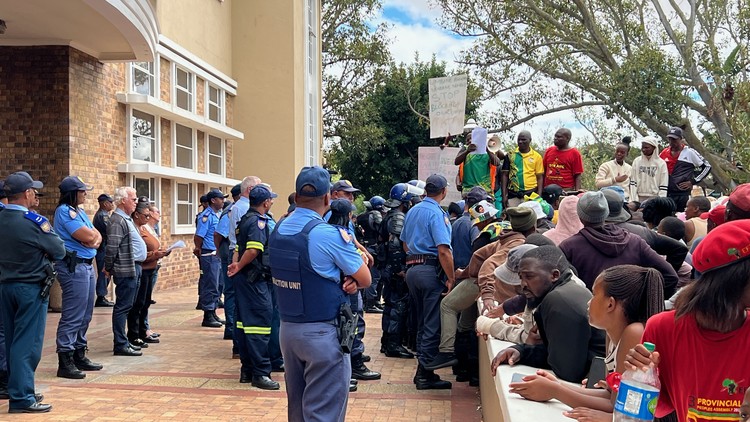Malmesbury communities march against high water and electricity tariffs
“If you don’t have money to pay for water, the municipality blocks electricity” says protestor
Residents from Ilingelethu and Saamstaan townships in Malmesbury demand lower utilities tariffs from Swartland municipality. Photo: Peter Luhanga
Hundreds of residents from Ilingelethu and Saamstaan townships in Malmesbury walked 4km on Friday to demand lower utilities tariffs such as water and electricity.
They went to the Swartland municipality’s offices with a list of their grievances. Among their complaints is that water tariffs are higher than most households can afford. They also want to buy electricity directly from Eskom, rather than through the municipality, claiming this will be cheaper.
Committee member for Ward 9 in the Swartland municipality, Sizwe Myolwa, read out a three-page memorandum before handing it to Mayor Harold Cleophas, who signed it. He promised to respond in detail to the communities within the next two weeks.
Earlier, Myolwa told the mayor that their previous efforts, including protests, had not yielded any results. “The [Swartland municipality] electricity is expensive. We’re the poorest of the poor. When we purchase R100 electricity, we only get 28 units,” said Myolwa.
Protestor Nosipho Sogwabu is a mother of four children. She works twice a week, earning R200 per day. “I use the child support grant to pay for electricity and water. If you don’t have money to pay for water, the municipality blocks electricity. If you buy R100 electricity, you only get 28 units,” said Sogwabu.
Swartland municipality spokesperson, Mart-Marié Haasbroek, said: “A response will be given to the community within the timeframe. We appreciate the peaceful way in which this march was conducted. Law Enforcement, SAPS and POPS maintained a strong presence throughout and the protestors were safely escorted.”
Support independent journalism
Donate using Payfast

Next: Zuma lawyer to represent Judge Makhubele at misconduct inquiry
Previous: Wolwerivier transformed into a catwalk for International Women’s Day
© 2024 GroundUp. This article is licensed under a Creative Commons Attribution-NoDerivatives 4.0 International License.
You may republish this article, so long as you credit the authors and GroundUp, and do not change the text. Please include a link back to the original article.
We put an invisible pixel in the article so that we can count traffic to republishers. All analytics tools are solely on our servers. We do not give our logs to any third party. Logs are deleted after two weeks. We do not use any IP address identifying information except to count regional traffic. We are solely interested in counting hits, not tracking users. If you republish, please do not delete the invisible pixel.

